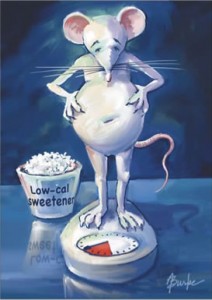
Low or zero-calorie doesn't always mean zero effects on your waistline.
(note: I originally published this post last year but somehow the formatting got really fouled up in the blog transition so I had to re-publish it… here you go!)
I get a TON of questions about sugar and sweeteners. Most people just want to know which are okay to eat and which are bad. But, of course, I can't just say “eat this, not that” without some kind of explanation behind it. In an effort to keep this as short and sweet (pun intended) as possible, I'm going to boil it down to a few key points
1. ALL sweeteners, caloric or non-caloric, can contribute to weight-gain or prohibit weight loss.
2. Sweeteners that come from nature are always better to consume than those that come from a lab or factory.
3. Regardless of the source, it's ALWAYS best to minimize your exposure to sweeteners.
Allow me to explain these points in some further detail.
1. ALL sweeteners, caloric or non-caloric, can contribute to weight-gain or prohibit weight loss.
Contrary to the popular belief that only calories can impact your waistline, there is strong evidence to suggest otherwise. Studies have shown that any sweet sensation can cause an insulin release in your body. When our bodies release insulin, we are in a storage-mode since insulin's job is to put nutrients into your cells. Most people who consume artificial sweeteners are thinking that they're doing themselves a favor by avoiding calories, but what's happening in their bodies is pretty much the opposite of their goal.
Here's how it goes…
Eat something sweet (regardless of calories) > Insulin is released > Body stores nutrients.
Correct me if I'm wrong, but when you were taking in that non-caloric sweetener, you were trying to avoid storing anything, right? The point was that you were avoiding consuming calories and maybe even trying to lose some body fat. Well, here's the newsflash. It's just not going to work.
Granted, there are some people out there who are not overweight and who consume non-caloric/chemical sweeteners. Maybe they're not having the same weight loss problems that others are, but they are still going to incur negative effects of putting those chemicals into their system.
But don't take my word for it. Here are just a few of the studies published on the topic of the metabolic effects and insulin response resulting from the consumption of artificial sweeteners:
A 2008 study in Behavioral Neuroscience “A Role for Sweet Taste: Calorie Predictive Relations in Energy Regulation by Rats” (PDF)
Medscape article: “Use of Artificial Sweeteners Linked to 2-Fold Increase in Diabetes”
Pubmed article: “The effect of artificial sweetener on insulin secretion. 1. The effect of acesulfame K on insulin secretion in the rat (studies in vivo).”
![]()
PSS Episode 21 – time 34:30 (does it halt/stall weight loss? yes! )
PSS Episode 15 – time 23:30 (sweeteners in tea/coffee)
Besides negative metabolic effects, artificial sweeteners have been identified as the cause of a litany of health problems including but not limited to:
- migraines and headaches
- dizziness / poor equilibrium
- convulsions and seizures
- nausea and vomiting
- fatigue and weakness
- change in mood
- change in vision
- change in heart rate
- diarrhea
- joint pain
- memory loss
- sleep problems / insomnia
- hives / rash
(Source: Mercola.com)
I don't know about you, but if I was suffering from any of the above symptoms, I'm not sure that I'd be able to keep myself on the healthiest eating plan. So besides having the above-listed negative side-effects, the ramifications from the consumption of artificial sweeteners can be very far-reaching. For more on the subject, I would recommend checking out dorway.com and mercola.com and searching through some articles.
2. Sweeteners that come from nature are always better to consume than those that come from a lab or factory.
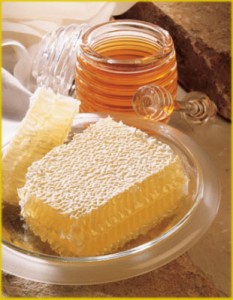
Image courtesy of: queenbeegardens.blogspot.com
I think it's really easy to fall for hype and marketing when it comes to the latest and greatest in the world of what Robb Wolf likes to call “better living through chemistry.” Unfortunately, chemical sweeteners are not what he's talking about there. The bottom line: ANYTHING that comes from nature will ALWAYS be better for you than something that was made in a lab or a factory. Period. I don't care if it's a fist full of honey vs a teaspoon of Splenda – give me the honey!
Non-chemical sweeteners include:
- raw honey
- regular honey (which has been pasteurized/heated and has fewer nutrients than raw)
- molasses
- date sugar, palm sugar, coconut sugar
- fruit juice
- maple syrup (real/organic/grade b)
- cane sugar
- green leaf stevia
We can also classify things like high fructose corn syrup (HFCS), agave and brown rice syrup as non-chemical sweeteners though that sort of makes me cringe to say it.
Non-chemical sweeteners are not necessarily “healthy,” it simply means that they’re refined from something that was found in nature and are not made from chemicals. Typically, non-chemical sweeteners can be metabolized by our bodies while chemical sweeteners cannot and are considered toxins within our system. As with all toxins that enter our system, they are stored in our fat cells.
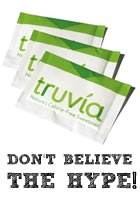 Chemical sweeteners include:
Chemical sweeteners include:
- Aspartame (branded as Equal)
- Saccharin
- Stevia that is white (branded as Truvia and Sun Crystals currently)
- Sucralose (branded as Splenda)
- and a new one that will be available soon called Tagatose.
Which sweeteners are okay to use in moderation & which to avoid entirely.
Okay in moderation, use organic whenever possible:
- honey, preferably raw (this is what I use most of the time if I need a sweetener for something)
- grade b maple syrup (the real stuff! I reach for this second when I want that maple-y flavor in a recipe)
- molasses
- date sugar
- fruit juice
- green leaf stevia
Never use!
- Aspartame (Equal)
- Saccharin (Sweet n Low)
- Stevia- when it's white/bleached (Truvia, Sun Crystals)
- Sucralose (Splenda)
- Tagatose
3. Regardless of the source, it's ALWAYS best to minimize your exposure to sweeteners.
Finding hidden sweeteners in common foods & snacks: Be a sweetener detective!
- Check the total carbohydrate grams in the food, then check the sugar grams- remember that 4g of sugar is 1tsp
- Look for ingredients that end in “-ose” or “-tol” – this means it’s a sweetener. For example: sucralose, glucose, sucrose, fructose, dextrose, maltose, lactose, levulose, mannitol, sorbitol, xylitol
- Look for the words sugar, nectar, syrup, crystals. These are typically derived from more natural sources, but are STILL sweeteners and you should be aware of their presence.
- When reading ingredient lists, remember that the first item listed is the largest percentage of the item, and so on. So, if a sweetener is listed within the first few ingredients, the item will have a pretty high amount of sweetener in it relative to the rest of the ingredients.
Examples:
Kashi GoLean Crunch Cereal: 1 cup serving size, 37g Carbs, 13g Sugar (More than 1 Tbsp!) Sweeteners: Evaporated Cane Juice Crystals listed 3rd after the grains and the added soy protein concentrate (which are both topics for another day), then Brown Rice Syrup listed 4th and Honey listed 8th.
Yoplait Strawberry Yogurt: 1 container serving – 6oz Sweeteners: Sugar listed 2nd, High Fructose Corn Syrup listed 4th.
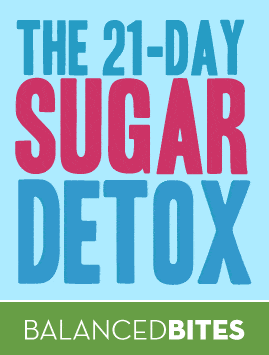 Detox yourself and get over your addiction to sugar and carbs!
Detox yourself and get over your addiction to sugar and carbs!
Check out my simple, real-food based program: The 21-Day Sugar Detox. You’ll love the challenge and you’ll feel great after!
Enjoy & be well!
Diane Sanfilippo
BS, Certified Nutrition Educator, C.H.E.K. Holistic Lifestyle Coach
San Francisco Nutritionist & Paleo Nutritionist serving the Bay Area and beyond via phone & Skype consultations.

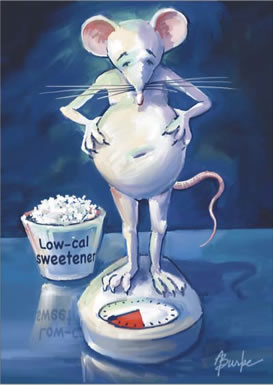
Comments 55
Hi Diane,
great insight, this has definitely made me rethink my use of sweeteners – i mostly use truvia, thinking i was doing the right thing…i think it might be time for a detox, YIKES!!!
i am just curious on your thoughts on coconut sugar and coconut nectar?? i have seen this pop up in a few recipes and just recently spotted it at the market. i was tempted to try it but thought i would so a little more research before i wasted the money.
thanks for your valuable insight!
what are your thoughts on coconut crystals and nectar?
Diane, I am interested in what you have to say about this too.
They’re natural sweeteners, not chemicals, but still sugar. I wouldn’t advocate using ANY sweeteners with abandon, but most of the natural ones are fine here or there – not daily. Chemical sweeteners are never okay.
can you elaborate on agave a bit? Thanks!
It has a very high fructose content, leaving it very similar to HFCS in composition. Fructose metabolism happens in the liver first, which is not ideal for us… taxing our livers with excess fructose isn’t something we want to do. Our livers need to work on so many metabolic and detoxification processes that lessening the blow in any way we can is a good plan. Google “non alcoholic fatty liver disease” if you want more on that.
Hi Diane,
Great site! Thank you! I would also love more insight on agave. Also if a product has stevia listed as an ingredient, is it safe to assume they used the plant, or could it still be the white powder or some other fake version?
Hi there-
Thanks and welcome to the site. Agave is comprised in the greatest percentage of fructose (possibly higher in fructose than high fructose corn syrup depending on the brand/type/etc.). When our bodies process fructose, our liver needs to begin the metabolic process before the sugars are broken down into their usable form of glucose in the body. The problem with agave is that it’s basically a glorified HFCS from a metabolic perspective, if not even worse. Our livers are hard at work just trying to detox our system, so putting more pressure on them with refined sweeteners isn’t something we want to do. A raw honey will be much more of a while/unrefined food and while relatively high in fructose as a percentage of it’s makeup, it’s much lower in fructose when compared to the refined sweeteners.
I would not eat packaged foods sweetened with stevia personally on any regular basis, though here or there they are probably okay. What’s the product? I just avoid “foods” like that as a general rule anyway.
Thankyou for the “skinny” on Agave…I was pulled into it because of the “low glycimic” factor. I did not know that is so taxing on the liver. I will throw it out and go back to honey when I need a sweetner.
I have a brand of stevia called Sweetleaf. The ingredients list inulin fiber and stevia extract as the only two ingredients and the box says it’s chemical free. The powder is white, opinions?
What are you using it for and how often? It’s probably made from the alcohol version of the stevia which is how they make the extract, but I personally wouldn’t use it with any regularity. Stevia is green in nature. Use it green or leave it. Would you use a clear honey without it’s natural yellow hue?
What about the liquid stevias from Sweetleaf that are flavored? The ingredients are water and Stevia. If not, where can we find green stevia?
I added some links to the stevia above– here it is also: http://amzn.to/ryUEYR
The liquid extract is okay, but I would just watch out for over-use/reliance on it for sweetness regularly. It may also contain additives and ingredients you don’t want to consume.
Thank you for this and for the links. I have metabolic syndrome and started low carb in April, lost 10 lbs and no more but was using artificial sweeteners. I have stopped using them except Truvia, which I see is on your list (will cut it out, too)! I have lost weight since cutting back so much and starting the Leptin Rx. I am thinking your 21-day sugar detox could be for me. 🙂 Now if I could just quite my 2x/week graveyard shift….
I am wondering why you specify grade B maple syrup… What is the difference from grade A?
This is so interesting, thank you! Could I share this in my blog?
And a few questions: 1. does fruit raise insulin levels in the way other sweeteners do? 2.how many portions of fruit a day do you recommend? 3.You don’t recommend agave as a sweetener? If not, could you explain a little bit more about this? Thank you! 🙂
Do sugar alcohols fall under the same guidelines? I rarely see those addressed in articles about artificial sweeteners. I don’t suggest that they are good for you but am wondering if the negative impact is the same as the other artificial sweeteners mentioned.
My guess is that the sweet taste will affect it. I have also heard about some issues with IBS/IBD triggering from sugar alcohols. I just don’t think they make much sense. If we’re going to eat something sweet, calories should follow. That’s nature.
Hi 🙂 I appreciate this post so much and I apologize for this question as it may have already been addressed…I realize that you say white powdered stevia is not good because of its processing, but what about NuNatural’s stevia…which has no other ingredient in it other than stevia? I would really appreciate your say on this because I consume that stevia.
Thank you so much,
Sophie
… 🙁
A girlfriend of mind likes using the Sweat Leaf Stevia packets in moderation for a sweetener. I haven’t tried it yet and wondering if it’s recommended? Thanks!
Read my post on Truvia here: http://blogbb.wpengine.com/2011/01/there-is-nothing-honest-about-truvia.html
I don’t recommend any stevia that’s white– the green powder or extract here or there is probably okay.
Great post! I try to avoid sweeteners, but sometimes drink a licorice spice tea that is slightly sweet from licorice root. Do you think that licorice tea would have the same effect as a sweetener?
Love to see some studies backing this up, very interesting. Your first further reading link 404’ed. The second study was inconclusive, a suggestive study needing further investigation. And I couldn’t read the third as I don’t have s subscription. Would be great if you could provide some more links 🙂
Old post! I’ll see if I can get them linked up again.
Thought you might be interested in this. I definitely see why lowering or eliminating sweeteners is a good idea, natural or chemical. However, there doesn’t seem to be much scientific evidence to back up the claim that artificial sweeteners cause an insulin spike. http://www.marksdailyapple.com/artificial-sweeteners-insulin/#axzz22uTp57jt
Thanks. I wrote this post originally a long time ago and haven’t had the time to come back to check out more research since then (even the date on this post is much later than I originally wrote it as it was re-posted here from another blog where it first appeared). I’ll revisit this very soon as I had seen Mark’s post as well and would like to dig a bit more!
Hi Diane, what a great info piece! Making people aware of the importance of eliminating sugars & artificial sweeteners is so important and your information here is an excellent! Thanks for sharing this info!
THANK YOU. I have been using NOW FOODS BETTER STEVIA, ORGANIC LIQUID EXTRACT. I don’t mind the 11% alcohol so much since I am using just a few drops a day, but I had no idea there was a green stevia. I am going to get that.
The link below is the liquid extract that i am using in case you have any further comments on it …. I suppose that it is refined since the liquid is almost clear, not green. For oils a lot of the time manufacturers use hexane to extract the oil, and some hexane residue is left. I wonder what they use to extract the stevia into a liquid form for this product …. if I find out I will let you know. THANKS AGAIN http://www.swansonvitamins.com/NWF397/ItemDetail
I like to use liquid stevia in my iced tea and tea. I don’t think the powder will dissolve well. Can anyone comment on this product? It has no alchohol, and is made by steeping the stevia leaves in water. The ingredients are stevia and water. It is a dark, thick, liquid.
http://www.vitasprings.com/stevia-concentrate-liquid-wisdom-natural.html
What are your thoughts on liquid stevia extract?
1) What’s so bad about bleached stevia?
2) What about “natural” sugars (honey, date sugar, etc) makes them superior to plain old table sugar (besides trace minerals that I could just as easily get eating other foods)?
Great resource! Thanks for posting this! (I do realize it was quite some time ago 🙂 but just saw it now!)
What about Xylitol? It is my choice and I like the oral health benefits that go with it. Curious about your thoughts on it.
I’m not a fan of sugar alcohols. I like more natural sweeteners versus those made in labs – just my .02.
Xylitol is fine as long as it comes from non-GMO sources as Xylitol comes from either Birch trees or corn, mostly corn, so make sure it says “NON-GMO corn” or whatever ingredient.
And yes, it has natural antibacterial properties especially for the mouth.
Xylitol is highly toxic to dogs… the reason I don’t keep anything in my house that contains it.
What about monk fruit?
Diane, I am so happy to read this post of yours. I very rarely use any sweetener, at most I might be consuming around 4 teaspoons of raw honey per month, and I personally think it is the best choice.
However, there is a very popular blogger where I am based who says all sugar is the devil, and this person almost always refers to natural honey as being just as bad as refined sugar, or even worse, making all of their readers believe this is a big poison. They say that whoever recommends using honey has no idea of the phyisiological process that it produces in the body and most probably does not have a glucometer nearby. I am aware this person has a family member who has type 1 diabetes, but I seem to think that they believe that everybody should eat and act the same as if they were diabetic. From reading you, I understand that you do not have the same ideas about honey. This person’s followers put me down for having a bit of raw honey every now and then, but I don’t have great arguments against the aggressive ones they put forward on the site. What would you reply to this? I am especially concerned about some friends who, following the advice put forward by this person, consume a sweetener called tagatose on a daily basis, as this apparently is the perfect sweetener according to them.
I would love your views on this subject Diane. Thank you very much.
my argument on this would be from addictive point of view. Due to the addictive properties in sugar, one must advocate that since all sugar is treated the same, then honey would be considered an addictive? just a thought, and I am no nutritionist, but a person looking to gain fruitful knowledge in the health realm. 🙂
Any concentrated sweeteners can be problematic, it all depends on the person.
what can I take instead of truvia?
What about Nectresse or Monkfruit in the raw?
Pingback: Diane Sanfilippo | New York Times bestselling author of "Practical Paleo" and "The 21-Day Sugar Detox" | Home of the Balanced Bites Podcast
what are your thoughts on the effects of fructose on the liver (ie fructose creating fatty liver)
Author
As in HFCS, probably likely – as in from whole fruit, probably not likely.
Pingback: Paleo V, Day 9, Sugar and Artificial Sweeteners « Crossfit Rebels
Pingback: Ask Avo: Sweetener in Coffee?? | Avo Health and Fitness Coaching
Xylitol is the worst!! It’s found in so many products from chewing gum to toothpastes and “dry mouth rinses”. After using “Biotene” dry mouth rinse (sweetened with Xyitol) for one year (off and on) my mouth is so dry my tongue is sticking to my mouth and interferes with my swallowing!!! The doctor said I should keep using Biotene because there is nothing else on the market! Now there’s a good reason! Needless to say, I tried to follow doctors orders, but soon realized that I have a Xylitol sensitivity which makes it immediately worse! Meanwhile I am living with my head hanging over a vaporizer just to swallow and need to take xanex to keep from hyper-ventilating! I find that honey is somewhat soothing & enables me to swallow occasionally. I am currently seeking 2nd opinions from local ent’s. I will never touch the stuff again!!!
At least honey is natural and can be broken down. I am not a nutritionist but have always heard it has medicinal properties and is good for your immune system. It is especially promoted by our local lavender farm that claims they have honey with lavender that is anti inflammatory. I am headed over there today for a new bottle!
I wonder why nothing was mentioned about candida, parasites and cancer? It’s my understanding that sugar feeds those three things. That being the case, I would rather have something like xylitol or Stevia so I could still have a sweet flavor and not feed pathogen’s like the aforementioned.
I didn’t mention them because I’m not an expert on any of those topics. I have had a candida expert on the Balanced Bites podcast that you are welcome to listen in on (check the archives by topic). You can definitely use a sugar alcohol or stevia for those issues, but I am not a fan of sugar alcohols (I think they’re too new to know much about how they may impact us). I do note stevia (preferably green powder) as a good option.
Best,
Diane
Do you have any thoughts on Clearly American Unsweetened sparkling water?
The ingredients are:
Carbonated Water, Natural Flavors
Author
In general I don’t love natural flavors in products unless you can get clarity from a company on what that truly means. Companies can hide a lot of not-so-great ingredients behind that name “natural flavors.”